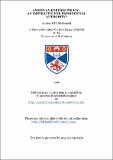Files in this item
American foreign policy : an imperative for presidential authority?
Item metadata
| dc.contributor.advisor | Trevor, Salmon | |
| dc.contributor.author | McDonald, Audrey Patricia Helen | |
| dc.coverage.spatial | xi, 185 (18) p. | en_US |
| dc.date.accessioned | 2018-06-25T14:40:35Z | |
| dc.date.available | 2018-06-25T14:40:35Z | |
| dc.date.issued | 1990-07 | |
| dc.identifier.uri | https://hdl.handle.net/10023/14552 | |
| dc.description.abstract | The American Constitution is over two hundred years old. It was the product of the times and reflects the two images of government, Presidential and Congressional. The memories of both the Continental Congress and George III played an important part. However, the imperative of strong leadership, more especially in the twentieth century as the United States withdrew from isolationism and confronted two world wars and an international depression, and a hostile environment, dictated that the President became the preeminent branch of government. For the most part political thinking and public opinion extolled this steadfast and virtuous leadership, while Congress largely submitted to Presidential domination. However, the Vietnam War, and later Watergate radically shook this consensus. The war was perceived to be the President's war; it was seen as the product of an "Imperial Presidency". The President was blamed for America's involvement in Indochina, and this together with Watergate, appeared to symbolise a Presidency out of control. Congress was shamed and felt responsible for the rise of the Imperial Presidency. Thus, in the wake of the Vietnam War and Watergate, Congress sought to assert its long eroded prerogatives. The 1970s witnessed a series of legislative initiatives intended to curb the Imperial Presidency in foreign policy. However, Congress reasserted itself with such fervour and determination that the whole future of American foreign policy was put to risk, especially with regard to coherence, continuity and flexibility. The 1970s legislation greatly limited the President's range of options in foreign policy. America, a superpower, cannot conduct a coherent foreign policy with two heads at the stern. The international system necessitates strong purposive leadership, leadership which can only be furnished by the President. Congress plays a vital role as regards discussion and consensus formation, but the time has come for Congress to recognise that it cannot compete with the President in foreign policy formulation and implementation. To try threatens the future success of American foreign policy. | en_US |
| dc.subject.lcc | JK573.M3 | en |
| dc.subject.lcsh | United States--Foreign relations | en |
| dc.subject.lcsh | Presidents--United States | en |
| dc.title | American foreign policy : an imperative for presidential authority? |
This item appears in the following Collection(s)
Items in the St Andrews Research Repository are protected by copyright, with all rights reserved, unless otherwise indicated.

